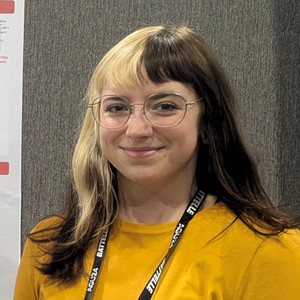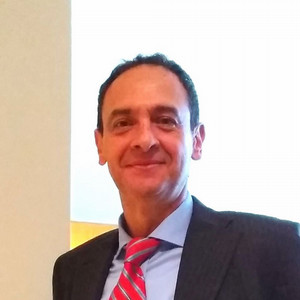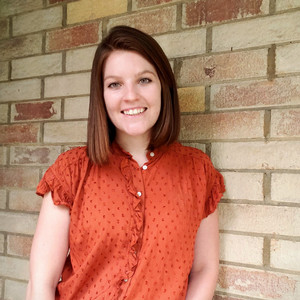People
Faculty Graduate Students Research Staff Alumni

Candice Bedford, Research Scientist
Candice is a geochemist and mineralogist interested in planetary surface processes on the Earth and Mars. Most of her current research involves the use of Laser Induced Breakdown Spectroscopy (LIBS) by the Curiosity rover’s ChemCam instrument and the Perseverance rover’s SuperCam instrument on Mars to investigate the geological history of Mars. She also does a lot of research in Iceland, a place that is mineralogically similar to Mars, to ground-truth our hypotheses for Mars and test how useful different analytical instruments and instrument techniques are for future missions to other planetary bodies. Her research interests are geochemistry, mineralogy, volcanism, aeolian processes, fluvial processes, and astrobiology.

Katie Bristol, Postdoc
Katie is a geophysicist at the Purdue Planetary Magnetics Laboratory where she investigates magnetic records preserved in meteorites to understand the formation and evolution of Young Stellar Objects and protoplanetary disks. She also uses Precambrian rocks to study the early thermal evolution and differentiation of planets and their magnetic fields, exploring links to planetary habitability. Previously she has worked on interdisciplinary projects, such as combining paleomagnetic methods with volcanology, geochronology, and modeling to study the emplacement of Large Igneous Provinces and their impact on Earth's geological and climatic history.
Katie earned her BS in Applied Geopysics (minor in Geological Engineering) and MS in Geophysics from Michigan Technological University. She also holds a PhD in Geology from the University of Florida.

Adrian Broz, Postdoc
Adrian is a postdoctoral research in Briony Horgan’s Planetary Surface Processes Lab at Purdue University and a postdoctoral researcher on the Mastcam-Z team on Mars 2020 Perseverance Rover. He earned a BS and MS from Cal Poly, San Luis Obispo, and a PhD in Earth Sciences from the University of Oregon. He is interested in the alteration history and biosignature preservation potential of rocks at Jezero Crater. Some of his past work includes stable isotope paleoclimatology, mineralogy & diagenesis of Mars-analog paleosols from Oregon; Ediacaran paleontology and alteration history of rocks at the Precambrian-Cambrian boundary; weathering on land leading up to Neoproterozoic snowball Earth; and organic preservation in Archean (3.0-3.7 Ga) nonmarine rocks from Australia and Greenland. Adrian’s work with Mastcam-Z seeks to understand the composition, geological history, and biosignature preservation potential of rocks at Jezero Crater, and to link observations from Mastcam-Z with observations from orbital satellites.

Enzo Cataldo, Postdoc
Enzo is a postdoctoral researcher who analyzes data related to distal ejecta from impact craters on the Moon. His goal is to understand how distal ejecta shapes the lunar surface through quantitative analysis of observational data and the development and application of advanced analytical and numerical models. While working at the Lunar Reconnaissance Orbiter (LRO) Science Operation Center at Arizona State University (ASU), Enzo analyzed a large population of bowl-shaped impact craters located in the maria, and used crater morphology, depth/diameter ratios and ejecta abundance and distribution to reclassify them. Statistical analysis was used to identify transitional members in terms of depth/diameter ratios and other geometric features. Enzo holds a PhD in Geological Sciences from ASU, an MSc from Lancaster University, U.K., and an Italian “laurea” in Geological Sciences. His specialty area is numerical/analytical and computational fluid dynamics (CFD) modeling of volcanic processes on the Moon, Mars and Io.

Perianne Johnson, Postdoc
Peri is a theoretical planetary scientist interested in icy worlds in the outer solar system. She uses physical models to explain spacecraft measurements of icy worlds, and also to make predictions for what future spacecraft missions might observe on unexplored bodies. She has modeled the transport of nitrogen ice on Pluto's surface over annual and million-year timescales, including the creation of Pluto's giant ice sheet Sputnik Planitia, informed by data from NASA's New Horizons mission. Recently, she developed a model of seafloor erosion and sediment transport for use on ocean worlds, such as Europa and Enceladus. Peri received her bachelor's and master's degrees in Physics from New Mexico Institute of Mining and Technology, and her master's and PhD in Astrophysical and Planetary Sciences from University of Colorado. From 2023-2025, she was a Distinguished Postdoctoral Fellow at the University of Texas Institute for Geophysics, before joining the Bramson Group as a postdoc in 2025.

Clement Royer, Postdoc
Clement studied in France at the Ecole Normale Supérieure de Paris-Saclay and did his PhD at the Institut d'Astrophysique Spatiale on the ground calibration of the SuperCam instrument on board the Perseverance rover, the preparation of Mars operations, and more generally the study of new generation IR spectrometers for space instruments. He is interested in the formation and alteration processes of planetary surfaces using an instrumental approach and fine data modeling. If he doesn't understand something, he models it!

Lingqi Zeng, Postdoc
Lingqi earned his bachelor's and master's degrees from Chengdu University of Technology in 2014 and 2017, respectively. During his studies, he developed a keen interest in Cenozoic lacustrine deposits of the Tibetan Plateau. Pursuing his curiosity for lacustrine processes, he carried out research on the paleolake deposits of the Miocene Ries impact structure and received his Ph.D. in 2022 from Georg-August-Universität Göttingen in Germany. As a post-doc at Purdue University, he turned his focus from Earth to Mars and aims to understand hydrothermal and lacustrine processes on the ancient Martian surface. Lingqi enjoys cooking, Via Ferrata, mountaineering and biking.